Managing large construction projects is a complex task. Teams need to coordinate on multiple fronts, track vast amounts of resources, and keep a tight rein on budgets. Balancing these responsibilities can often feel like a high-wire act, with profitability hanging in the balance.
ERP systems hold the key to addressing these challenges.
Understanding ERP’s Impact on Construction
Enterprise Resource Planning (ERP) systems are revolutionizing the construction industry, offering solutions like those provided by SmartBarrel that enhance efficiency and decision-making. They provide a unified platform that integrates various business processes and functions. This integration helps streamline operations, leading to:
- Improved efficiency
- Enhanced decision-making capabilities
- Better financial management
With ERP systems, construction firms can manage project complexities more effectively. They centralize data from different departments, offering real-time insights that drive informed decisions.
The benefits of ERP in the construction industry, such as streamlined business processes and informed decision-making, are becoming increasingly apparent.
According to a report, there’s a growing trend towards cloud-based ERP solutions, emphasizing ERP’s potential to transform the sector (McKinsey & Co). These solutions offer enhanced accessibility and significant savings on IT infrastructure costs. This shift indicates the potential of ERP in construction industry to transform the sector, emphasizing streamlined business processes and informed decision-making.
Despite its low adoption rate of 1.98% among main ERP users, the construction industry stands to gain substantially from ERP implementation.
The following chart illustrates this point:
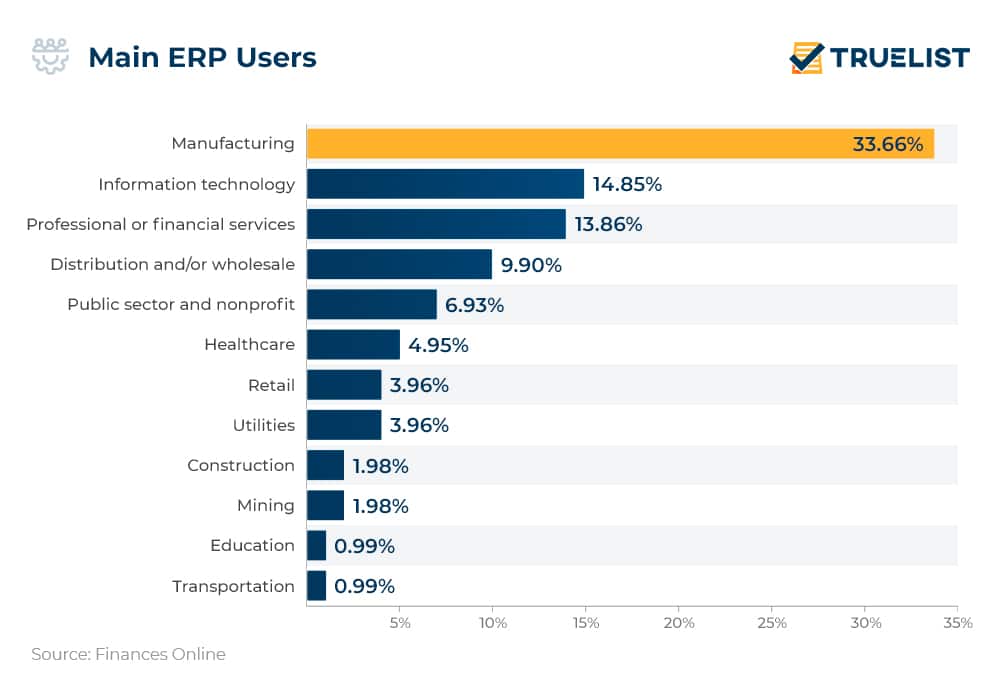
The projected market size of $200.7 billion by 2033 for global ERP software underlines the robustness of this technology, as shown in the chart below:
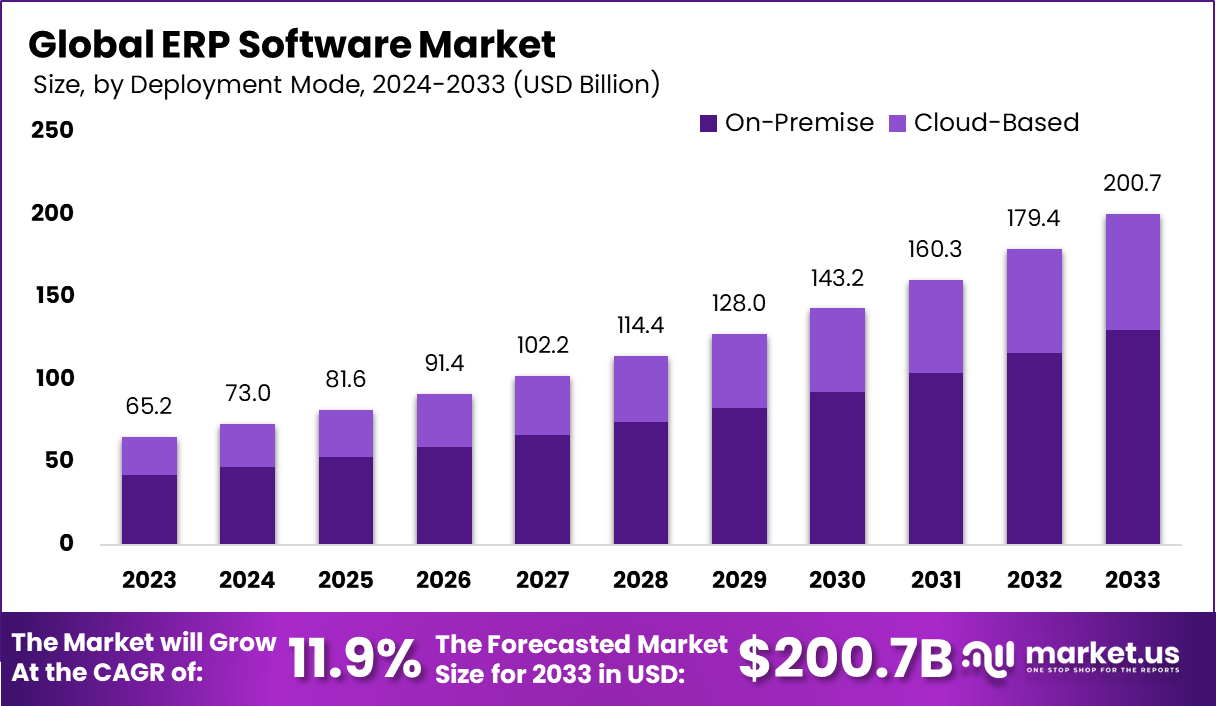
This article delves into the world of construction ERP software. It explores:
- The myriad benefits it offers
- The challenges it helps overcome
- Specific features tailored for construction needs
- Real-world applications that underscore its value
To provide a more comprehensive analysis, the article should delve into construction ERP’s strategic advantages, such as its role in facilitating better project management and resource allocation.
It should also explore operational efficiencies, including how construction ERP software can automate routine tasks and streamline workflows. Financial benefits, including cost savings and improved budget management, deserve attention, along with a discussion on the potential ROI from ERP implementation. Finally, the article should cover how ERP supports scalability and growth for construction businesses, preparing them for future challenges and opportunities.
For specialty electrical sub-contractors working on large-scale projects, embracing ERP could be the game-changer they need to enhance operational efficiency, reduce costs, and sharpen their competitive edge.
Next, we dive deeper into what ERP entails for the construction sector and why it’s becoming an indispensable tool for managing today’s complex projects.
What is ERP in the Construction Industry?

In the construction industry, ERP (Enterprise Resource Planning) systems integrate various business processes—like inventory, procurement, finance, and human resources—into a single comprehensive system. This integration streamlines processes and information across the organization, significantly enhancing efficiency and productivity.
In simpler terms, think of construction ERP as the central nervous system of construction management. Like the nervous system coordinates different parts of the body, ERP coordinates different parts of a business.
- ERP software automate and optimize operations.
- This leads to improved efficiency and productivity.
Imagine trying to manage a large construction project manually or through disjointed systems. It’s like trying to complete a puzzle without having all the pieces fit together perfectly. The pieces represent different areas of your business—inventory, procurement, finance, human resources, and more.
Without an integrated construction ERP solution, managing these areas separately can lead to inefficiencies, errors, and missed opportunities.
ERP as the Central Nervous System of Construction Management
Drawing an analogy, construction ERP system acts as the central nervous system of construction management. It collects data from various departments, analyzes it, and offers insights. This centralized approach ensures that decision-makers have access to real-time information. It allows for:
- Better resource allocation
- Timely procurement of materials
- Efficient workforce management
- Accurate financial tracking
For instance, when a delay occurs in one part of a project, ERP software can automatically adjust schedules and resources. This responsiveness saves time and reduces costs by avoiding bottlenecks and ensuring smooth operations.
By integrating various business processes, an Integrated ERP solution helps construction firms become more agile. They can quickly adapt to changes in project scope, regulations, or market conditions. It also promotes collaboration among teams by providing a unified platform for sharing information.
Discover how SmartBarrel’s integrated ERP solutions can streamline your construction project management, ensuring 100% accurate labor tracking and real-time reporting.
To sum up, embracing an Integrated construction ERP solution means choosing a path towards operational excellence. It’s about making informed decisions based on comprehensive data rather than gut feelings or incomplete information.
Adding to the discussion, construction ERP systems address common challenges such as cost control, project management, and resource allocation with remarkable precision. The potential ROI from implementing these systems is significant, supporting scalability and growth.
This strategic advantage, coupled with operational efficiencies and financial benefits, positions ERP as an indispensable tool for construction firms aiming for success.
Transitioning into the next section, we’ll explore how this technology specifically benefits construction projects. We’ll examine its impact on efficiency, cost reduction, and competitive advantage – essential aspects for specialty electrical subcontractors aiming for success in today’s challenging market.
Prerequisites for Streamlined Business Processes and Efficient Project Management in ERP Implementation
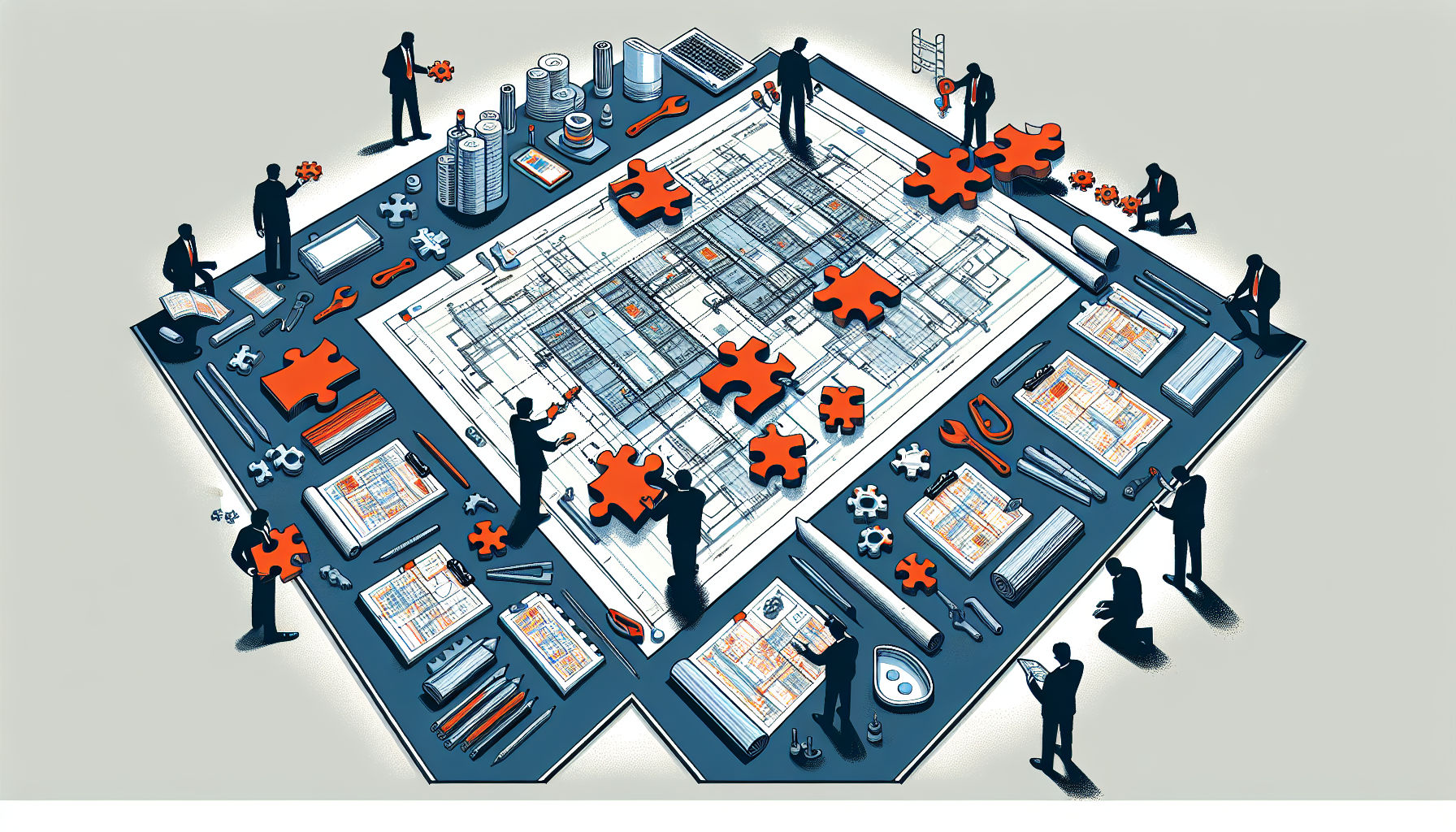
Before diving into the specifics of how ERP software can transform construction project management, it’s crucial to understand the foundational steps necessary for successful ERP implementation. These steps ensure that the construction ERP system aligns perfectly with your business needs and technological capabilities.
Assessing Your Business Needs
Understanding your specific business challenges and requirements is the first step towards leveraging construction ERP software effectively.
- Review current processes. Take a close look at your existing workflows. Observe how various departments interact and where bottlenecks or inefficiencies occur.
- Identify pain points. Pinpoint areas that cause delays, cost overruns, or quality issues. These could range from procurement to human resource management.
- Consult with stakeholders. Engage with everyone from project managers to field workers. Their insights can reveal critical areas that need improvement.
ERP systems are designed to manage the complexities of construction projects, including project management, financials, supply chain, and human resources. A thorough understanding of your business challenges and requirements allows you to select an construction ERP system that addresses these aspects effectively. For insights into managing one of these challenges, see how SmartBarrel helps with calculating direct labor costs in construction.
Ensuring Technological Readiness
The right technological infrastructure is pivotal for the smooth implementation and operation of an ERP system.
- Evaluate existing IT systems. Determine if your current technology can support an ERP solution. If not, you may need to upgrade hardware or software before implementation.
- Plan for data migration. Consider how you will transfer existing data into the new ERP system. This step is crucial for maintaining continuity and accuracy in project management and financial tracking.
- Consider scalability and future needs. Ensure that the ERP system you choose can grow with your business. It should be able to accommodate new projects, functionalities, or technologies as your needs evolve.
Cloud-based ERP solutions are gaining popularity due to their accessibility and reduced IT infrastructure costs. These benefits highlight the importance of technological readiness and the advantages of adopting cloud-based solutions for enhanced access and cost savings. SmartBarrel’s suite of construction management solutions, including its cloud-based ERP system, is designed to meet these needs, offering seamless integration and real-time reporting to improve efficiency and decision-making on construction projects.
To better understand the financial implications of ERP implementation, consider the following breakdown of costs. This chart illustrates that costs are distributed across several key areas, emphasizing the multifaceted investment required for ERP software.
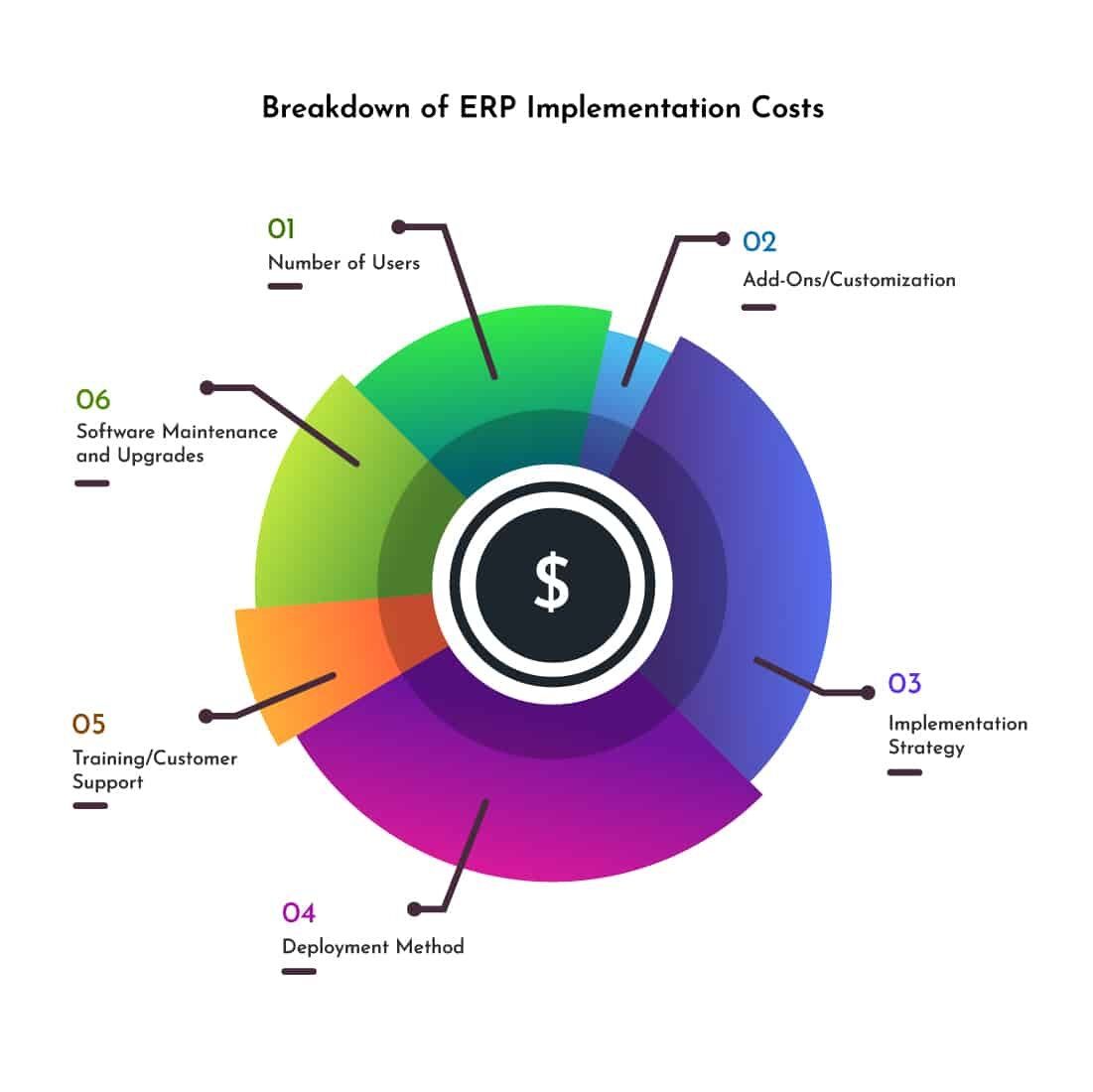
Understanding these costs helps subcontractors plan for the total cost of ownership, beyond just the initial implementation.
By addressing these prerequisites, specialty electrical subcontractors can pave the way for a successful ERP implementation. This preparation not only facilitates a smoother transition but also maximizes the benefits of ERP software in achieving streamlined business processes and enhancing project management efficiency.
Next, we will delve into how an effectively implemented ERP system can transform day-to-day operations, making construction businesses more agile, efficient, and competitive.
How to Maximize Benefits of ERP in Construction
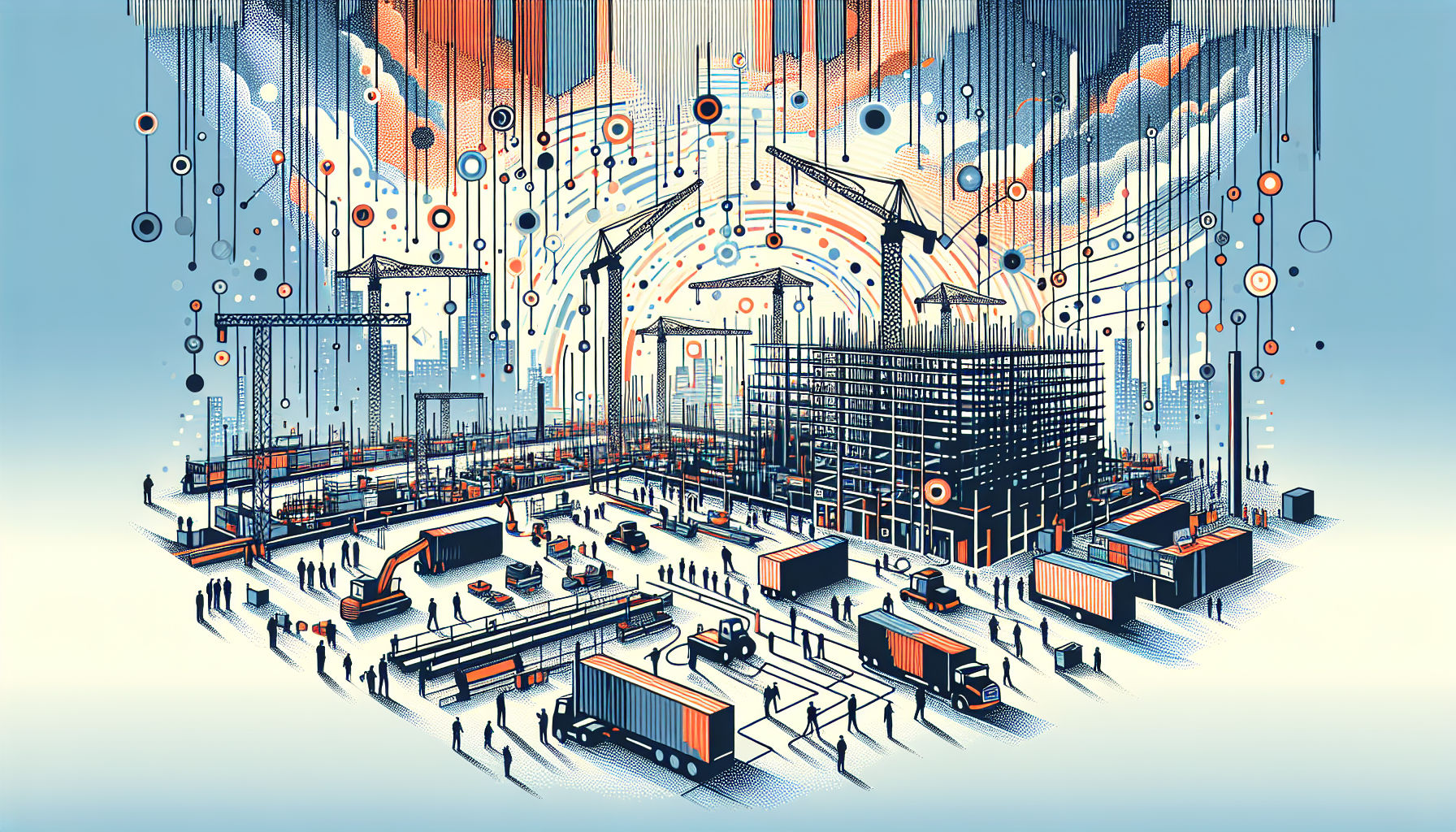
Choosing the right ERP system and preparing your business for its implementation are crucial steps. Next, we’ll explore how to fully harness the power of ERP in the construction industry.
Step 1: Choose the Right ERP Solution
Selecting an ERP solution that fits your construction needs is paramount. Here’s how to make an informed choice:
- Criteria for selecting an ERP system tailored to construction needs: construction ERP software is designed to grow with the business, offering scalable solutions that can be customized to meet changing needs. It’s crucial to focus on scalability and customization during your selection process, ensuring the system can adapt to your evolving business landscape.
- Importance of customization and scalability: The ability to customize and scale the ERP system as your business evolves is crucial. This flexibility ensures that the system remains relevant and valuable over time, addressing your specific needs.
- Tips on evaluating ERP vendors and solutions: Assess ERP solutions based on their integration capabilities with other software tools and platforms. This feature is key in enhancing operational efficiency and ensuring seamless data flow across departments.
Exploring these criteria thoroughly will help you select an ERP solution that not only meets your current requirements but also supports future growth and changes in the construction industry. For instance, the Prism Electric case study demonstrates how integrating time tracking with an ERP system can streamline payroll processes and provide valuable project data, showcasing the tangible benefits of a well-selected ERP solution.
For insights into various time tracking solutions that can be seamlessly integrated with construction ERP software, enhancing operational efficiency, see SmartBarrel’s top 6 solutions for construction time tracking. Selecting a compatible and comprehensive solution is crucial for maximizing the benefits of ERP in the construction industry.
Step 2: Engage Stakeholders Early
For a construction ERP implementation to be successful, securing buy-in from all organizational levels is essential. Here’s how to engage stakeholders effectively:
- Strategies for securing buy-in from all levels of the organization: Highlight the benefits of ERP, such as improved efficiency and better decision-making capabilities. Emphasize the system’s potential for cost savings and competitive advantage.
- The role of clear communication and training in successful adoption: Implement a transparent communication plan that addresses stakeholders’ concerns and queries. Provide comprehensive training to ensure smooth adoption across the organization.
- Examples of stakeholder engagement activities: Host workshops or demo sessions that allow stakeholders to experience the ERP system firsthand. Gather feedback and address any issues to foster a sense of ownership among all participants.
Engaging stakeholders early in the process paves the way for smooth implementation and widespread acceptance of the new system.
Step 3: Implement with Best Practices in Mind
Implementing an ERP system in construction requires careful planning and execution. Here’s what to consider:
- Overview of best practices for ERP implementation: Embrace a phased approach to roll out, starting with core functionalities before adding more complex features. This method reduces disruption and allows for adjustment based on early feedback.
- Importance of phased rollout and continuous support: A phased rollout facilitates easier adaptation by users and provides opportunities for training and feedback. Continuous support ensures that any issues are promptly addressed, enhancing user confidence in the system.
- Advice on monitoring and adjusting the implementation process: Regularly assess the implementation’s progress against set milestones. Be prepared to make adjustments based on user feedback and evolving business needs.
Considering these best practices can significantly reduce the common hurdles associated with ERP implementation, ensuring a smoother transition for your construction business.
Step 4: Leverage Construction ERP for Data-Driven Decisions
Maximizing the benefits of ERP hinges on its ability to facilitate data-driven decisions. Here’s how to achieve this:
- How to use ERP for real-time insights and analytics: Utilize the ERP system’s analytics features to gather real-time data on project progress, resource allocation, and financial performance. This information enables timely adjustments to keep projects on track.
- Examples of data-driven decision-making in construction: Use ERP-generated reports to identify cost-saving opportunities, optimize resource utilization, and forecast future project needs accurately.
- Tips on creating a culture of continuous improvement: Encourage a mindset of data analysis and continuous learning within your organization. Regularly review ERP-generated insights to identify areas for improvement and drive operational efficiency.
By following these steps, construction firms can enhance Revenue forecasting, achieve greater Cost efficiency, and make more data-driven decisions.
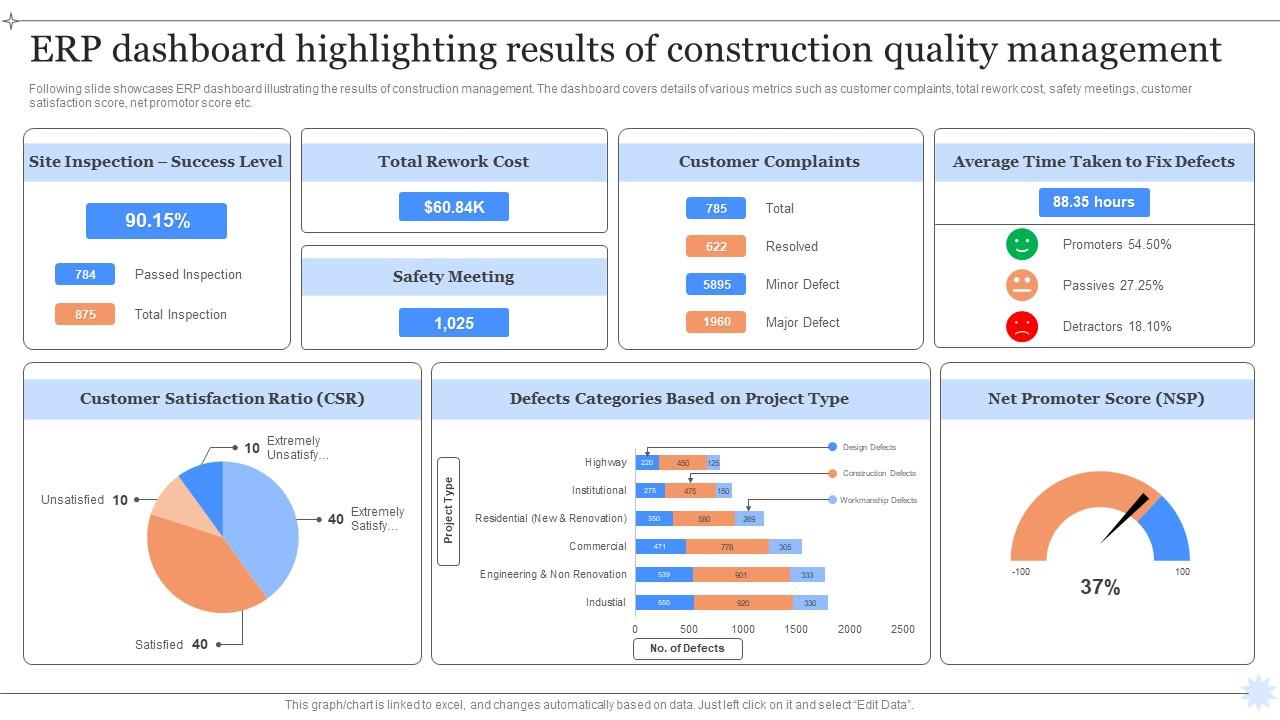
These advantages illustrate the three core benefits of construction ERP, empowering businesses to operate more efficiently, adapt swiftly to changes, and maintain a competitive edge.
Now let’s look forward to understanding its impact on project outcomes and overall business success.
ERP Features Specific to Construction

The construction industry faces unique challenges that require specialized solutions. Construction ERP software integrates essential modules tailored to address these needs. Let’s delve into the key features that make ERP indispensable for construction management.
Overview of essential construction ERP modules
- Project management
- Centralizes all project-related information, offering a comprehensive view of project progress, deadlines, and resource allocation. This integration ensures that project managers can make informed decisions rapidly, improving project outcomes.
- Financial management
- Provides real-time visibility into financial data such as budgets, cash flow, and expenses. This transparency helps in maintaining tight control over project finances, crucial for managing thin margins in construction.
- Procurement and inventory
- Manages sourcing, purchasing, and tracking of materials. It optimizes inventory levels, reduces waste, and ensures materials are available when needed, thereby avoiding delays.
- Human resources
- Streamlines HR processes, from recruitment to payroll. It helps in effectively managing the workforce, ensuring the right personnel are available and productive.
- Equipment tracking
- Keeps tabs on equipment location, status, and maintenance schedules. This feature minimizes downtime and extends the lifespan of valuable machinery.
The power of an ERP system in the construction industry lies not just in the individual modules but in their integration. This cohesive framework facilitates seamless communication between departments and processes.
A single source of truth for data reduces errors and inefficiencies, enhancing operational excellence. For example, changes in project schedules can automatically update procurement orders and labor allocations, ensuring all aspects of a project are coordinated.
The diagram below illustrates the seamless integration of construction ERP modules.
Highlighting the Role of an Integrated Construction ERP Solution in Enhancing Cost Control and Resource Allocation
Effective cost control and resource allocation are critical for the success of any construction project. An integrated ERP solution offers tools for meticulous budgeting, forecasting, and tracking of expenses against revenues. This capability allows businesses to identify variances early and adjust strategies accordingly.
Additionally, by optimizing resource allocation—be it material, labor, or equipment—construction ERP software ensures projects are completed within budget and timelines.
In summary, ERP software systems are tailor-made to conquer the complex landscape of construction management. They support project management excellence, streamline financial management, enhance cost control, and ensure efficient use of resources.
By leveraging technologies like SmartBarrel’s integrated ERP solution, construction firms can gain a significant competitive advantage.
Understanding the theoretical benefits of construction ERP software sets the stage for appreciating their practical impact, even though specific case studies are beyond the scope of this section.
Real-world ERP Applications in Construction

The adoption of Enterprise Resource Planning (ERP) systems in the construction industry offers significant benefits, including operational success and cost efficiency. This section examines case studies and examples demonstrating ERP’s transformative impact, highlighting solutions like those provided by SmartBarrel.
Case studies of successful ERP implementations
CMiC Global highlights the experience of PJ Dick, which utilized CMiC’s ERP to enhance executional efficiencies. This adoption led to improved project and team performance, optimized processes, time savings, and error reduction.
The integration of CMiC Accounting and Project Management software provided real-time data visibility, enabling reliable financial reporting and improved project budgeting and forecasting. Their success story is a testament to the benefits of ERP in the construction industry (CMiC Global).
Another example comes from Nxweb, a mid-sized construction business that turned to a cloud-based ERP system for centralized project data. This move resulted in a 20% reduction in project delays, a 15% increase in project efficiency, a 30% decrease in purchasing costs, and a 25% drop in manual errors (M4ERP).
In addition to the above, the Kiewit case study showcases SmartBarrel’s role in enhancing efficiency through technology. Faced with attendance tracking challenges on a complex project, Kiewit deployed SmartBarrel devices for real-time, accurate attendance tracking, resulting in estimated daily savings of $5,000.
Impact of ERP on operational success and cost efficiency
Construction ERP software contribute significantly to operational efficiency and cost efficiency. By supporting data-driven decisions on project management, procurement, and workforce deployment, firms can preempt issues, manage disputes with factual data, and optimize equipment investments based on utilization rates.
ConstructConnect outlines how connecting data across sectors enables construction teams to work more cohesively, completing projects within budget and before deadlines (ConstructConnect).
Examples of how construction ERP supports data-driven decisions
ERP software integrated analytics capabilities provide real-time insights into construction management. Key areas include project progress, resource allocation, and financial performance. These insights enable firms to make timely adjustments, keeping projects on course.
For specialty electrical subcontractors, leveraging ERP software facilitates data-driven decisions, enhancing operational excellence and cost efficiency. This strategic approach not only transforms project management but also maximizes ROI in construction, setting a new standard for success.
Fulton & Roark experienced centralized operations and a year-over-year sales increase of 50% without additional headcount after implementing NetSuite ERP. Such examples underscore the potential for ROI in construction through wise technology investments.
Similarly, Green Rabbit’s adoption of NetSuite enabled the handling of tens of thousands of orders per day without delays, showcasing the ERP’s ability to scale operations effectively (NetSuite).
The integrated analytics capabilities of ERP software facilitate real-time insights into various aspects of construction management, from project progress and resource allocation to financial performance. These insights allow firms to make timely adjustments, ensuring projects remain on track.
For specialty electrical subcontractors, these examples provide a roadmap for leveraging ERP software to achieve operational excellence. The potential for enhanced cost efficiency and improved decision-making capabilities can transform how projects are managed and executed.
A closer look at an ERP dashboard designed for construction quality management reveals the scale of this impact.
The following chart illustrates key metrics of operational control and customer understanding in construction quality management.
This data suggests a high level of operational control and significant cost savings opportunities highlighted. It’s clear that ERP software offer measurable benefits for managing construction quality effectively.
As we explore these real-life applications of ERP in construction, it’s evident that the technology offers more than just theoretical advantages. By embracing ERP solutions like SmartBarrel’s products tailored for the construction industry, businesses can streamline operations, reduce costs, and make informed decisions that drive success.
Moving ahead, we’ll examine how related urban construction projects benefit from integrating SmartBarrel’s innovative solutions with their ERP software. This practical insight will demonstrate how technology enhances operational success and cost-efficiency on the ground.
Conclusion

In the rapidly evolving landscape of the construction industry, ERP software have emerged as a strategic solution for managing the complexities of construction projects, including project management, financials, supply chain, and human resources. The journey through this article underscored ERP’s pivotal role in blending these aspects into a cohesive and streamlined operation.
As we’ve explored, construction ERP systems are not just another tool in the toolbox; they represent a transformative approach to construction management that fosters:
- Operational excellence: By integrating disparate business processes and functions, construction ERP software facilitate a seamless workflow, ensuring that every facet of a construction project is harmonized towards the collective goal.
- Cost reduction: Through automating and optimizing operations, ERP brings about significant improvements in efficiency and productivity, leading to substantial cost savings across projects.
- Competitive advantage: In a field as competitive as construction, the ability to deliver projects on time and within budget is paramount. ERP software empower construction companies with real-time insights and analytics, enabling data-driven decisions that enhance project outcomes.
The strategic value of construction ERP software, particularly in achieving operational excellence, driving cost reduction, and securing a competitive advantage, cannot be overstated.
From fostering operational excellence and driving cost reduction to securing a competitive edge, construction ERP software offers a comprehensive solution to many of the challenges faced by specialty electrical subcontractors.
In light of these insights, it is imperative for stakeholders within the construction industry to not only consider but actively pursue ERP as a solution to their management challenges.
The transformative potential of construction ERP in streamlining operations, reducing costs, and enhancing decision-making capabilities is a game-changer for businesses aiming for operational efficiency and financial success.
As emphasized by successful case studies, including how AG Contractors saved time and money with SmartBarrel, integrating sophisticated ERP solutions into your business strategy is essential for staying competitive in today’s fast-paced construction environment.
SmartBarrel stands at the forefront of this technological revolution, offering a suite of construction management solutions such as biometric time tracking and safety management, designed to seamlessly integrate with and complement ERP systems, enhancing overall project efficiency and success.
With features like cost and productivity tracking, manpower tracking, and access control, SmartBarrel epitomizes the synergy between technology and construction excellence. Leveraging such advanced tools can significantly enhance jobsite efficiency, safety, compliance, and ultimately, ensure the successful completion of projects within scope, time, and budget constraints.
In conclusion, embracing ERP software in the construction sector, complemented by SmartBarrel’s advanced construction management solutions, is not just about improving operations—it’s about setting a new standard of excellence and future-proofing your business in a competitive marketplace.
Discover more about SmartBarrel’s project management solutions.
- Improved data security: Protects sensitive information through centralized data management and advanced access control.
- Standardized data and compliance support: Ensures consistency and accuracy in reporting, aligning with regulatory standards.
- Increased productivity: Automates manual processes, freeing up resources for more strategic tasks.
- Enhanced visibility and scalability: Provides a comprehensive view of operations while adapting to business growth.
- Cost savings and organized workflows: Optimizes resource allocation and reduces redundancies, leading to significant financial efficiencies.
Learn how SmartBarrel enhances financial management.




